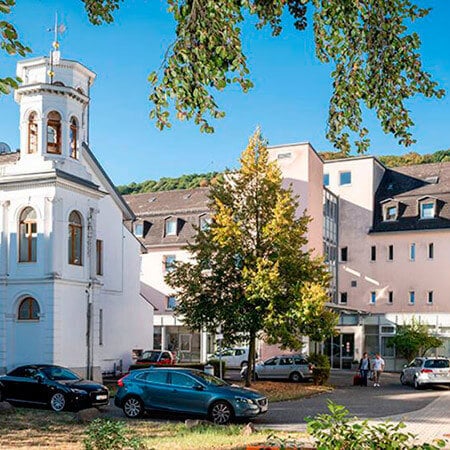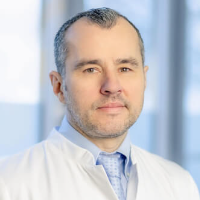Lung Cancer — Embolization of the Bleeding Vessels: treatment in the Best Hospitals of Germany
Treatment prices are regulated by national law of the corresponding countries, but can also include additional hospital coefficients. In order to receive the individual cost calculation, please send us the request and medical records.

Department of Adult and Pediatric Diagnostic, Interventional Radiology
The Department of Adult and Pediatric Diagnostic, Interventional Radiology provides the full range of services in these fields and specializes in conducting radiologic examinations, high-intensity focused ultrasound (HIFU) therapy, vascular, oncological, orthopedic and urologic interventions. The department includes specialized Sections for Gynecologic, Pediatric and Orthopedic Radiology.






Department of Adult and Pediatric Diagnostic, Interventional Radiology
The Department of Adult and Pediatric Diagnostic, Interventional Radiology offers all modern methods of high-precision imaging diagnostics and minimally invasive imaging-guided therapeutic procedures. The department meets all radiation protection standards, which are especially important in the diagnostics of children and adolescents. The basis of successful clinical practice of the medical facility is a progressive technological base and the best highly qualified specialists.



Department of Interventional Radiology
The Department of Interventional Radiology offers the full range of modern diagnostic procedures using ionizing radiation, image-guided tissue sampling (biopsy), and minimally invasive therapeutic procedures. Patients may be seen on an inpatient or outpatient basis. To achieve optimal results, the department works closely with specialists in radiation therapy, oncology, neurology, neurosurgery and neuro-oncology, as well as urology, orthopedics, pain management, and palliative care. This collaboration helps ensure an accurate diagnosis and the most effective treatment.




Lung cancer is a dangerous disease in which healthy cells are transformed into atypical cells and begin to grow uncontrollably and spread to nearby tissues. A malignant tumor disrupts the work of organs, and at the advanced stages of its development – the functioning of the whole organism. Going beyond the boundaries of the lungs, the pathological formation primarily affects the lymph nodes located nearby. Thereafter, if treatment for lung cancer is not started or is not effective enough, metastases can be found in the kidneys, brain, spleen, and healthy liver tissue.
Overview
Lung cancer is the most common malignant neoplasm in the world, as well as the most common cause of death among oncology patients. It is characterized by a latent course and early appearance of metastases. According to the data of International Agency for Research on Cancer, one million cases of lung oncology are registered annually. At the same time, the statistics of this disease are deplorable: six out of ten patients die because of lung cancer. The incidence of lung cancer depends on the area of residence, degree of industrialization, climatic and working conditions, gender, age, genetic predisposition, and other factors.
Primary lung cancer is cancer that has developed from cells of the lungs. The bronchoscopy allows taking a sample of tumor and determining the type of cancer. Doctors distinguish two main types of lung cancer: small cell lung carcinoma, which accounts for about 15% of all lung cancer patients, and non-small cell lung carcinoma, which is more common and accounts for about 85% of all patients with this oncology.
These two types differ in the growth and spreading patterns, as well as in the approaches to their diagnosis and treatment. Therefore, it is important to distinguish them. For example, non-small cell lung carcinomas are usually removed surgically, while small cell lung carcinomas are treated with medications, sometimes along with radiation therapy.
Symptoms
At the early stages, lung cancer is not accompanied by any symptoms and turns out to be an accidental finding during routine examinations. Symptoms of lung cancer can be caused by the tumor itself, or be a consequence of the spread of the disease with the involvement of neighboring organs. The most common symptoms of lung cancer are:
- Persistent cough
- Difficulty breathing
- Shortness of breath
- Wheezing
- Blood in sputum
- Chest pain
There also may be a hoarse voice, impaired swallowing, weight loss, weakness, and loss of appetite.
Diagnostics
To determine the correct treatment tactics, it is necessary to establish the histological type of lung cancer and its stage. For this, radiological diagnostic techniques such as radiography, computed tomography, magnetic resonance imaging, and positron emission tomography are used.
The main diagnostic examination for suspected lung cancer is computed tomography of the chest. It provides comprehensive information about the tumor, the state of the lung tissue around the tumor, lymph nodes, ribs, and spine. In some cases, as decided by the radiologist, computed tomography is performed after intravenous administration of contrast agents.
To assess the stage of the disease, ultrasound scanning and CT scan of the abdominal cavity are also performed.
Positron emission tomography is an imaging technique that assesses the metabolic activity of tissues. This diagnostic test is especially informative in lung cancer, for assessing the spread of cancer cells to other areas of the body.
Laboratory blood tests are also performed.
Treatment
Embolization is considered an effective treatment for lung cancer.
Embolization is a minimally invasive surgical procedure for treating lung cancer patients. The essence of the embolization is a targeted blockage of blood vessels. Vascular embolization is often used in the treatment of lung cancer and lung metastases. The procedure causes ischemia of the tumor with its subsequent necrosis.
Endovascular embolization is the minimally invasive treatment. Operations to occlude blood vessels are performed to effectively treat a wide range of diseases in the sphere of oncology. The embolization procedure is performed to block the blood supply of malignant tumors.
Sometimes embolization with radiation particles is used in cancer treatment. Embolization with radiation particles is a cancer treatment in which radioactive substances are delivered to the tumor through the vessels. The radiation particles are delivered to the tumor, and their radiation kills cancer cells.
Embolization with radiation particles is often used in the treatment of lung cancer, also for treating lung metastases that do not respond to standard systemic chemotherapy. It is often used in patients who are unable to tolerate other treatments.
Embolization with radiation particles is preceded by an angiogram – examination of the vessels surrounding the tumor. The doctor inserts a catheter into the femoral artery. Under X-ray control, the catheter is moved into the bleeding blood vessels.
Then a liquid with tiny radiation particles (emboli with the radiation substance Yttrium-90) is injected. The radiation particles remain in the tumor, blocking blood flow to the cancer cells, killing them, shrinking the tumor and stopping the bleeding. The same time, lung tissue has minimal radiation exposure. The radiation inside the particles disappears within a month.
Embolization has a low risk of serious side effects.
Where can I undergo embolization in Germany?
Health tourism is becoming more and more popular these days, as oncology treatment in Germany often ensures a much better quality of embolization.
The following hospitals show the best success rates in embolization:
- University Frankfurt am Main
- University Hospital Halle (Saale)
- University Hospital Muenster
- University Hospital Rechts der Isar Munich
- HELIOS University Hospital Wuppertal
You can find more information about the hospitals on the Booking Health website.
The cost of treatment in Germany
The prices in hospitals listed on the Booking Health website are relatively low. With Booking Health, you can undergo embolization in Germany at an affordable price.
The cost of treatment varies, as the price depends on the hospital, the specifics of the disease, and the complexity of its treatment.
The cost of treatment in Germany with embolization is 9,201-9,855 EUR.
You might want to consider the cost of possible additional procedures and follow-up care. Therefore, the ultimate cost of treatment in Germany may differ from the initial price.
To make sure that the overall cost of treatment in Germany is suitable for you, contact us by leaving the request on the Booking Health website.
How can I undergo embolization in Germany?
It is not easy to self-organize any treatment abroad. It requires certain knowledge and expertise. Thus, it is safer, easier, and less stressful to use the services of a medical tourism agency.
As the largest and most transparent medical tourism agency in the world, Booking Health has up-to-date information about embolization in the best hospitals in Germany. We will help you select the right clinic taking into account your wishes for treatment.
We want to help you and take on all the troubles. You can be free of unnecessary stress, while Booking Health takes care of all organizational issues regarding the treatment. Our services are aimed at undergoing embolization safely and successfully.
Medical tourism can be easy! All you need to do is to leave a request on the Booking Health website, and our manager will contact you shortly.

